Why Should I Have My Wisdom Teeth Removed?
Do you remember getting excited about losing your baby teeth and waiting for the tooth fairy? Well, the arrival of your wisdom teeth probably feels quite different. These late bloomers typically make their grand entrance between ages 17 and 25, often bringing unwanted drama to your mouth in the form of pain, swelling, and crowding. While some lucky people sail through this milestone without issues, many discover their jaws simply don’t have room for these final guests.
Our comprehensive procedures at Goodove Oral Surgery help you navigate wisdom tooth concerns with the care and attention you deserve. We understand wisdom tooth problems can disrupt your daily life, which is why our experienced team takes the time to evaluate your unique situation and clearly explain your options, ensuring you feel confident about your treatment decisions.
Signs Your Wisdom Teeth Need Attention
Wisdom tooth problems often develop gradually, making early detection crucial for preventing complications. Pain in the back of your mouth frequently signals wisdom tooth issues, though symptoms vary widely among patients. Swelling, difficulty opening your mouth, and tender gums around the back teeth often indicate problems that require professional evaluation. Research published in the Journal of the American Dental Association reveals that nearly 88% of people have at least one impacted wisdom tooth that needs professional attention.
Common Symptoms to Watch For
Several warning signs suggest your wisdom teeth may need professional attention, including:
- Pain or tenderness in the back of your mouth
- Swelling around the jaw or gums
- Difficulty opening your mouth fully
- Bad breath despite good oral hygiene
- Bleeding gums near the back teeth
- Headaches or jaw pain
- Food getting trapped behind your back teeth
These symptoms often worsen without proper treatment, making timely evaluation necessary. By recognizing these symptoms early, you can improve your treatment outcomes and reduce your discomfort.
What are Impacted Wisdom Teeth?
Impacted wisdom teeth occur when your final molars cannot fully emerge through the gums due to insufficient space or improper positioning. This condition affects millions of people and requires careful evaluation to determine the best treatment approach.
Partial Impaction
Partial impaction occurs when a wisdom tooth grows in partially, leaving part of the tooth stuck under the gum. This can allow bacteria to accumulate around the partially emerged tooth, increasing your risk of infection and causing significant discomfort.
Complete Impaction
Complete impaction keeps the wisdom tooth entirely beneath the gum line, potentially causing damage to adjacent teeth. This can also lead to the development of cysts.
Types of Impaction
Wisdom teeth can become impacted in several ways, each presenting unique challenges:
- Mesial impactions angle the tooth toward the front of your mouth
- Distal impactions angle the tooth toward the back of the mouth
- Horizontal impactions position the tooth sideways
- Vertical impactions keep the tooth straight but prevent it from fully emerging
The type of impaction influences treatment complexity and recovery time. Our surgical team uses advanced imaging technology to assess your specific situation and develop the most effective treatment plan.
The Wisdom Tooth Removal Process
We begin your wisdom tooth removal with a comprehensive assessment using state-of-the-art imaging to accurately understand the position of your tooth and its surrounding structures. This thorough assessment allows us to plan your procedure carefully and discuss all aspects of your treatment.
Local anesthesia is used to keep you comfortable during the procedure, while sedation options provide additional relaxation for anxious patients. Our surgical staff monitors you closely throughout the process, maintaining the highest safety standards. Cone beam CT imaging helps us visualize complex cases with unprecedented detail.
Recovery typically includes several days of rest and following specific post-operative instructions. Most patients return to normal activities within a week, though healing continues for several weeks. We provide detailed recovery guidelines and remain available for any questions during your healing process.
When Bone Grafting May Be Necessary
Some wisdom tooth extractions require additional procedures to maintain jaw structure and prepare for potential future treatments. Bone grafting may be recommended when wisdom tooth removal results in significant bone loss or when surrounding teeth are damaged. This procedure helps preserve bone density and maintain your facial structure.
Bone grafting involves placing specialized bone material in the extraction site to promote natural bone regeneration. While not every wisdom tooth extraction requires this additional step, our team evaluates each case individually to determine the best approach for your long-term oral health.
Trust Your Hometown Oral Surgery Team at Goodove Oral Surgery
Your wisdom tooth concerns deserve the attention of experienced professionals who understand both the technical aspects of oral surgery and the importance of compassionate patient care. At Goodove Oral Surgery, we combine advanced surgical techniques with personalized attention, ensuring you receive the highest quality treatment in a comfortable environment. Our doctors maintain operating privileges at several local hospitals, including Virginia Beach Ambulatory Surgery Center and Bon Secours Maryview Medical Center, providing you with comprehensive care options.
As your hometown oral surgery practice, we’ve built our reputation on quality patient care and strong relationships with referring dentists throughout the Virginia Beach and Chesapeake communities. Our highly trained surgical staff takes extra steps to ensure your comfort, from providing warm blankets during procedures to accommodating special requests like playing your favorite music. Schedule a consultation with our Virginia Beach location at (757) 412-2002 or contact our Chesapeake office at (757) 819-7002.

